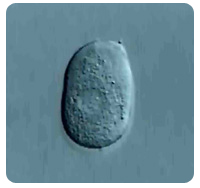
The biopsied cells are analyzed using a technique called the polymerase chain reaction (PCR). PCR is an in vitro simplified reproduction of the in vivo process of DNA replication. Taking advantage from the chemical properties of DNA and the availability of thermostable DNA polymerases, PCR allows for the enrichment of a DNA sample for a certain sequence.
PCR provides the possibility to obtain a large quantity of copies of a particular stretch of the genome, making further analysis possible. It is a highly sensitive and specific technology, which makes it suitable for all kinds of genetic diagnosis, including PGD.
Each cell contains a minute amount of DNA (a single copy). PCR is used to amplify the DNA to a detectable level. Once amplification has been accomplished scientists can use a variety of techniques to screen an individual gene for abnormalities. This procedure is known as Mutation Analysis.